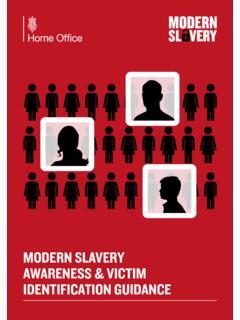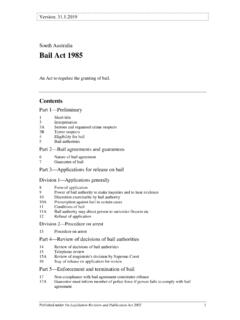Transcription of Investigative interviewing witness guide - FYI
1 Investigative interviewing witness guide Acknowledgement Much of this document is based on materials from National Policing Improvement Agency (NPIA) in the United Kingdom. The Investigative interviewing Unit gratefully acknowledges the generosity of: NPIA in allowing the New Zealand Police to use this and all their other 'PEACE' related material Dr Rebecca Milne, for her time, expertise and advice that have contributed to the development of this guidance. Other material comes from: Criminal Justice System (2007). Achieving Best Evidence in Criminal Proceedings: Guidance on interviewing victims and witnesses, and using special measures. London: Office for Criminal Justice Reform. Milne, R. & Bull, R. (1999). Investigative interviewing : Psychology and practice. Wiley: West Sussex Ord, B., Shaw, G., & Green, T. (2004). Investigative interviewing Explained. Lexis Nexis Butterworths: New South Wales Schollum, M.
2 (Sept 2005). Investigative interviewing : the literature. New Zealand Police: Wellington Purpose This document outlines the skills required to gain complete, accurate and reliable information from Investigative interviews with victims and witnesses. It develops on the foundation provided by the Investigative interviewing doctrine. Related information More information on Investigative interviewing can be found at Services/CIB Crime Service Centre/Service Units/ Investigative interviewing . Other documents in this series can be found at Intranet/Police Instructions/Police Manual/Investigations/ interviewing : Investigative interviewing doctrine Investigative interviewing suspect guide If you have any feedback please forward any comments to: Page 1 of 61. Introduction This document provides guidelines and procedures for: interviewing witnesses, including reluctant or difficult witnesses identifying and interviewing witnesses requiring special consideration the specialist interviewing of adult witnesses.
3 It is designed to support interviewers at all levels of the Investigative interviewing Standards and Training framework. Who is a witness ? Witnesses are people who have information about an alleged offence or offender. They may be an eyewitness, present at the event, or someone who can only provide peripheral information. In these guidelines, the term ' witness '.. does not victims suspects (defined in section 2 Victim Rights Act 2002 as a person injured or suffering loss Special provisions for dealing with or harm as a result of an offence) suspects are detailed in the Investigative interviewing suspect guide . What is the purpose of interviewing witnesses? The purpose of interviewing witnesses is to ascertain the witness 's account of the alleged event(s) and any other information that would assist the investigation. Guidelines are not prescriptive Every witness is different. Therefore the guidelines are not in a prescriptive format that must be rigidly followed, nor should they imply that all other techniques are unacceptable.
4 Instead, interviewers should be flexible, utilising techniques as and when you see fit depending on the interviewee, situation and circumstance. Merely following the guidelines will not make a good interview. interviewing is a skilled task requiring training, practice and judgement. As the interviewer, you may decide that in the interests of justice or to promote the witness 's well-being the interview requires procedures different to those described. Any decisions of this kind should be made in consultation with an NCO and, where appropriate, the prosecuting agency. Always behave ethically when interviewing Regardless of what approach you take, you must still always behave ethically and with the ten principles of Investigative interviewing in mind. Treat all witnesses as individuals As an investigator, interviewing witnesses is part of your everyday business. Witnesses come from a wide range of backgrounds and each presents you with different challenges.
5 They all have different needs and concerns, and levels of involvement in the investigation ( you may have a witness who is a victim of the crime or a witness with no links to the victim whatsoever but who saw what has occurred). There can never be a one size fits all' approach to the interaction with witnesses and individual circumstances should always be taken into consideration. Page 2 of 61. Give special care to victims Treat all witnesses with empathy and sensitivity. As victims are at high risk of being traumatised, additional provisions exist to ensure special care is taken. You must treat victims with courtesy and compassion and respect their dignity and privacy (s 2 Victims Rights Act 2002). Multiple witnesses If there is more than one witness to an incident care should be taken to minimise the risk of memory contamination between witnesses by: separating the witnesses as soon as is feasible and interviewing them individually if the interview is being delayed, consider asking the witnesses not to discuss the incident with other people involved and explaining to them why you are taking this action, the potential for post-event information to contaminate memory.
6 Be aware that a more flexible approach is required with witnesses that may be stressed by the incident as discussing it with others may help therapeutically. Witnesses who become suspects If a witness becomes a suspect during interview procedures for interviewing suspects should be adopted including complying with all legal requirements and visually recording the interview. The Criminal Investigations (Bodily Samples) Act 1995 section 2 provides a definition of a suspect: 'Suspect, in relation to an offence, means any person whom it is believed has or may have committed that offence, whether or not- (a) That person has been charged with that offence; or (b) There is good cause to suspect that person of having committed that offence.'. This means if there is sufficient evidence to charge, the interviewee should be cautioned. Gathering intelligence from witnesses The same procedures for interviewing witnesses should be applied when gathering intelligence.
7 Page 3 of 61. interviewing principles and framework Ten principles of Investigative interviewing Ten principles provide an authoritative guide to ethical interviewing . Approach all interviews with these principles in mind and use them to actively examine your own attitudes and behaviours. 1 interviewing is at the heart of investigation. 2 The aim of an interview is to discover the truth. 3 Information must be complete, accurate and reliable. 4 Keep an open mind. 5 Act fairly. 6 Questioning can be persistent. 7 Some witnesses require special consideration. 8 Suspects must be interviewed in accordance with the law. 9 Special care must be taken to identify suspects requiring special consideration. 10 Be sensitive to cultural background and religious beliefs. PEACE interviewing framework Conduct witness interviews using the PEACE interviewing framework. Step Action 1 Planning and preparation: Review available information and establish interview aims and objectives.
8 2 Engage and explain: Develop rapport and explain interview processes and procedures. 3 Account: Using an appropriate interview model gain an account of events and probe the account for more information. 4 Closure: Conclude the interview and address any concerns. 5 Evaluation: Evaluate how the information obtained impacts on the investigation and also evaluate the performance of the interviewer. Interview models These three interview models are used within the PEACE framework: Free recall: encourages cooperative interviewees to give their own account of what happened in their own time and without interruptions. Conversation management: enables the interviewer to control the interview and elicit as much information as possible from a reluctant interviewee. Enhanced cognitive interviewing : builds on free recall using advanced techniques to assist a cooperative interviewee to recall as much high quality information as possible.
9 Advice For advice on Investigative interviewing related matters contact the Investigative interviewing Unit at Police National Headquarters on extension 44662 or at Forms All Investigative interviewing forms are located on 'Police Forms' under ' Investigative interviewing '. Page 4 of 61. Planning and preparing interviews Planning and preparation is one of the most important phases in effective interviewing . Always plan and prepare, no matter what type of interview is being considered, to ensure you are ready to conduct an effective and ethical interview. What should be covered when planning and preparing for an interview? Step Action 1 Consider these factors when planning and preparing for an interview: interview aims and objectives investigatively important topics witness profile: identity factors and current state legal requirements interview structure contingencies for interviewee reaction practical arrangements, including whether or not the interview should be delayed because the witness requires special consideration ( due to intoxication).
10 2 Decide if the witness requires special consideration and if they do what initial action you should take. 3 Complete a written interview plan where possible. Interview aims and objectives Develop a good understanding of the investigation and the purpose of the interview by: examining all available evidence - witness statements, scene examination, exhibits, and other supporting documents setting the aims and objectives for the interview. These should focus on the investigatively important topics that need to be covered. Investigatively important topics Identify topics needing to be explored for the investigation, including: circumstances of alleged offending including what happened: - immediately before the alleged offence - during and after the alleged offence all physical and verbal interactions between the witness and the alleged offender or anyone else type and severity of alleged offence offence ingredients and probable defences identity and description of the suspect and other witnesses covering ADVOKATES with eyewitnesses descriptions of the scene, exhibits and other items of interest how the alleged offence came to the notice of police.


